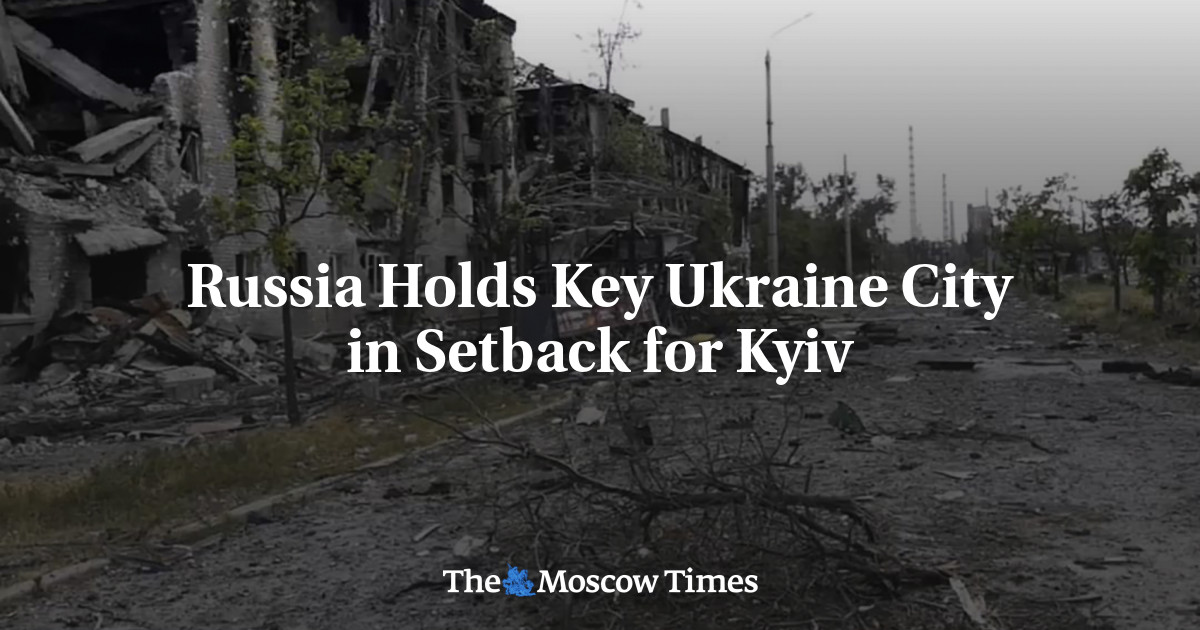
Russian troops were on Monday holding the strategic Ukrainian city of Lysychansk after Kyiv’s forces retreated, in a major boost for Russia’s campaign to seize the entire Donbas region of eastern Ukraine.
With the war now well into its fifth month after Russia’s invasion of Ukraine on Feb. 24, governments and organizations gathered for a conference in Switzerland to launch a plan to rebuild the country even as the conflict shows no sign of abating.
The loss of Lysychansk over the weekend prompted Ukrainian President Volodymyr Zelensky to step up calls for an increased supply of weapons from the West so Kyiv can keep up the resistance and regain lost territories.
After giving up on its initial war aim of capturing Kyiv following tough Ukrainian resistance, Russia has focused its efforts on securing control of the Donetsk and Luhansk areas which make up the Donbas region.
Russian Defense Minister Sergei Shoigu told President Vladimir Putin at the weekend that Moscow’s forces were now in full control of the Luhansk region.
Moscow’s capture of Lysychansk — one week after the Ukrainian army also retreated from the neighbouring city of Severodonetsk — frees up Russian forces to advance on Kramatorsk and Sloviansk in Donetsk.
“The continuation of the defense of the city (Lysychansk) would lead to fatal consequences” in the face of Russia’s superiority in numbers and equipment, the Ukrainian army said on Sunday, announcing its retreat.
“In order to preserve the lives of Ukrainian defenders, a decision was made to withdraw.”
‘Most modern weapons’
Luhansk region Governor Sergiy Gayday said on Telegram that there was still fighting in the town of Bilogorivka outside Lysychansk.
“We keep defending a small part of the Luhansk region so that our army could build protective redoubts,” he added.
In an address late Sunday, Zelensky vowed Kyiv would fight on and ensure the military had “the most modern weapons.”
“Ukraine will reach the level when the fire superiority of the occupiers will be leveled.”
In Sloviansk, about 75 kilometers (45 miles) west of Lysychansk, there were few people on the streets on Monday, the day after Russian strikes that left at least six dead, among them a nine-year-old girl, and 19 injured.
In the large downtown market largely ravaged by a fire caused by a Russian strike, a few vendors offered basic goods while others cleared charred debris.
Vendors and residents who spoke to AFP, some still in shock, expressed concern for the days and weeks to come, as sounds of shelling were heard again.
‘Win back the land’
The city of Siversk, 30 kilometers west of Lysychansk, also saw overnight shelling, residents and an official told AFP.
But Zelensky’s address Sunday evening was defiant, pointing to Ukrainian troops progressing in the Kharkiv and Kherson regions, and vowed “there will be a day when we will say the same about Donbas.”
“We will rebuild the walls, we will win back the land, and people must be protected above all else,” Zelensky said.
“Ukraine does not give anything up.”
On Monday, leaders from dozens of countries and international organizations were meeting in the Swiss city of Lugano, where they aim to hash out a roadmap for Ukraine’s reconstruction — expected to cost hundreds of billions of dollars.
Lugano is not a pledging conference but will instead attempt to lay out the principles and priorities for a rebuilding process aimed to begin even as the war rages.
‘Democracy over autocracy’
Ukraine will also face demands for broad reforms, especially in cracking down on corruption after Brussels recently granted Kyiv candidate status in its push to join the 27-member European Union.
Zelensky will address the conference by video, but the event is also being attended by Ukrainian Prime Minister Denys Shmyhal in a rare trip outside the country.
British Foreign Secretary Liz Truss is due to pledge both immediate humanitarian assistance as well as access to British financial and economic expertise, the foreign office said.
She will tell delegates that Ukraine’s recovery “will be a symbol of the power of democracy over autocracy,” it added.
But for residents in Bucha — a Ukrainian town synonymous with war crimes blamed on Moscow’s forces after their retreat in April — fear remains even as talk begins of reconstruction.
“We’re going to bed without knowing if we’ll wake up tomorrow,” said Vera Semeniouk, 65.
“Everyone has come back, is starting to repair houses, many are putting in new windows. It would be terrible if it started again and we had to leave everything again.”